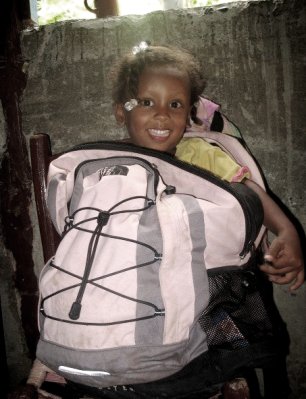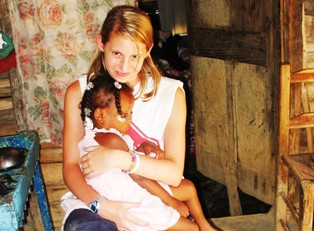By Erin Almand
I first saw her in a filthy purple dress and tattered Big-Bird sneakers, standing on the perimeter of the group. Her matted hair was braided and her little mouth was locked stubbornly around her thumb. She refused to play ball. She didnt want to sing or dance.
But when we began a game of peek-a-boo, I watched as her eyes changed from distrust and sadness to deep intrigue.
Why was I, a white-skinned teenager with a funny language, paying attention to her?
 Our game burst into a mad scramble of tickle monster. At last, Miley could contain it no longer. The corners of her mouth turned up, and my heart cracked. Then she laughed, then screamed, then ran. I held my hands near the ground to gather her up, and the chase was on.
Our game burst into a mad scramble of tickle monster. At last, Miley could contain it no longer. The corners of her mouth turned up, and my heart cracked. Then she laughed, then screamed, then ran. I held my hands near the ground to gather her up, and the chase was on.
I had once again broken through those terrible barriers. Miley, a poor, three-year-old Dominican girl, was mine now. I won her with a childs game, and her joy made me force back tears.
This summers three-week trip to the Dominican Republic made me realize that no experienceapart perhaps from personal tragedycan prepare an American teenager for life as well as a visit to the third world.
The term third world has no official definition. It is often used to categorize countries with a low UN Human Development Index rating. But what third world really means is this: People are hungry. Water is contaminated. Diseases spread quickly. Families are broken. And the kids like Miley all have tough outer shells.
My friends say I am an easy cry. Its not because I am an overly emotional person. Im not. But there is something that runs deep in me that undoes my heart when I see someone overcome difficulty, or when I witness suffering, or when a child the world has ignored decides to trust again.
Its compassion. My heart brims with it. Maybe it is because my family taught it by example, or because God blessed me with a tender spirit. Perhaps its a mixture of both. Whatever its root, compassion has come to define me.
In the Dominican Republic, the land and the living conditions stand in sharp contrast. Deep turquoise waters surround the island. It is eternally summer. The terrain is flat and lush and then suddenly, mountains sweep to 3,087 meters. The air is fresh: fresher than any I have ever breathed.
 Yet the pavement is splattered with the feces of livestock, chickens, and dogs that roam the streets. The houses are miniscule: few are bigger than my bedroom. Most of the floors are hard-packed dirt; every home houses a few large rats and many as-long-as-your-hand-is-wide cockroaches. Spiders abound, including tarantulas and brown recluses that grow to the size of small Frisbees.
Yet the pavement is splattered with the feces of livestock, chickens, and dogs that roam the streets. The houses are miniscule: few are bigger than my bedroom. Most of the floors are hard-packed dirt; every home houses a few large rats and many as-long-as-your-hand-is-wide cockroaches. Spiders abound, including tarantulas and brown recluses that grow to the size of small Frisbees.
We were a team of 20: 16 girls, a boy, three leaders. We stayed in the homes of two members of the local church in the town of Sabaneta, four hours west of the capitol. Soon after arriving, we learned that for much of the day there would be no running water. The only bathroom offered a toilet with a bucket for manual flushing and a trashcan for soiled paper. Most of us slept on the floor, on pads and under mosquito nets brought from the States. Our meals were rice, beans, and bananas, each prepared a dozen ways. Transportation was an open flatbed truck, which we rode up the mountain every day to the little village of Las Canitas.
Las Canitas is Mileys home. It is poorer than Sabaneta. Its 108 inhabitants are without electricity and purified water. They construct their houses with whatever they can find: cardboard, sticks, cement, rusted metal. The men farm, coaxing beans and corn from the rocky soil. The village is peaceful, yet there is a defiant, defeated spirit about it as well.
Our team taught the children in school each morning. We worked alongside the Las Canitans in their fields and homes. We helped lug water and wash their laundry by hand. We taught them about Jesus love and the church, and they taught us about hospitality and gratitude.
Our culture is defined by the fast and the material, but compassion takes time and offers lasting rewards. The Dalai Lama once said, If you want others to be happy, practice compassion. If you want to be happy, practice compassion. He could have been talking about me.
I learned that I take for granted things most people do not ever experience. I learned to persevere through adversity; things I thought were necessities I do not need at all. I surprised myself, too. I was able to look beyond my physical surroundings and love the people around me. This gives me hope, because I know that it is possible to feel joy despite circumstances and to love deeply those that the world deems unlovable.
Someday Soon
Little feet: To what great places?
Little hands: To what good work?
Little heart: To what promise?
Peek-a-boo, little Miley.
Erin is a freshman at Saint Louis University. She cant wait for spring to hit up here, and has successfully survived her first real winter. You can visit her on facebook or email her at ealmand@slu.edu.
